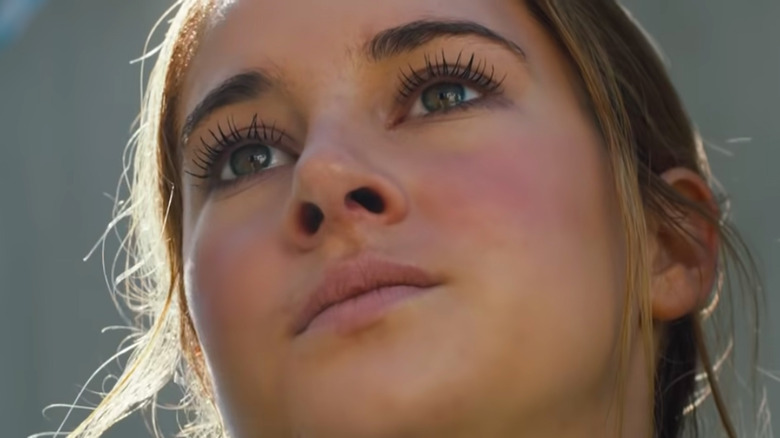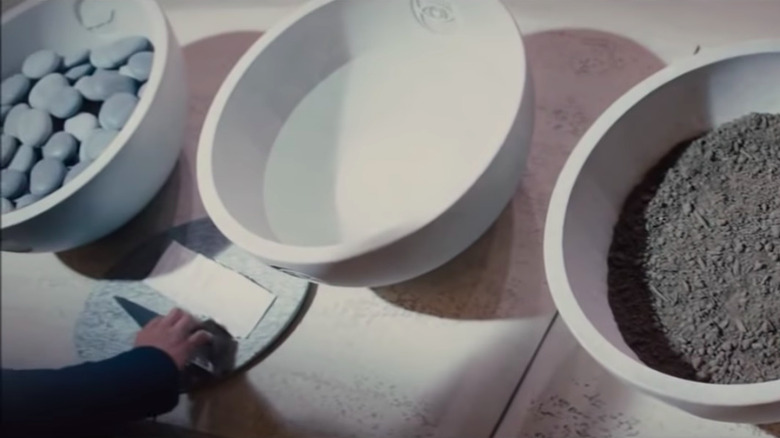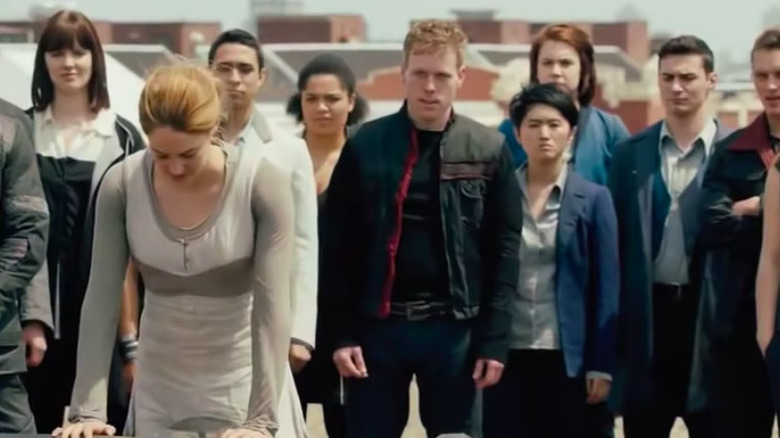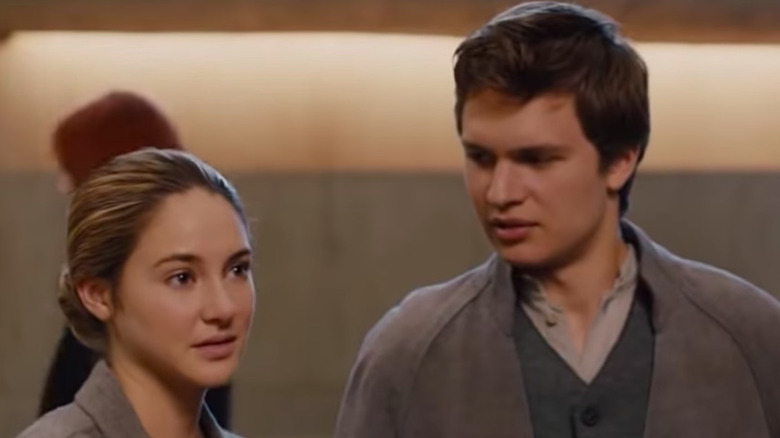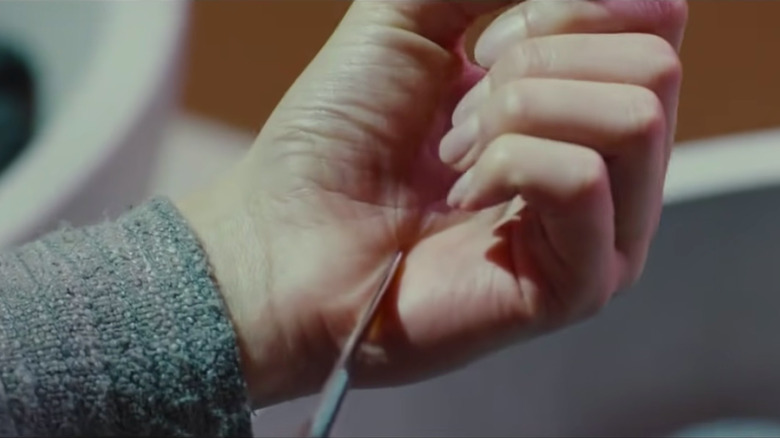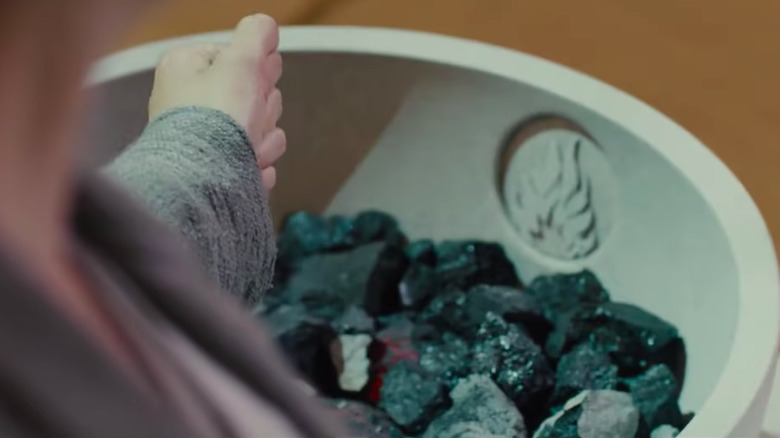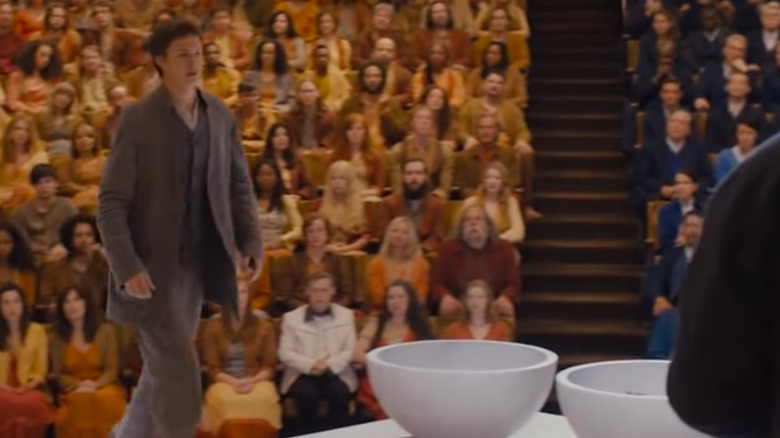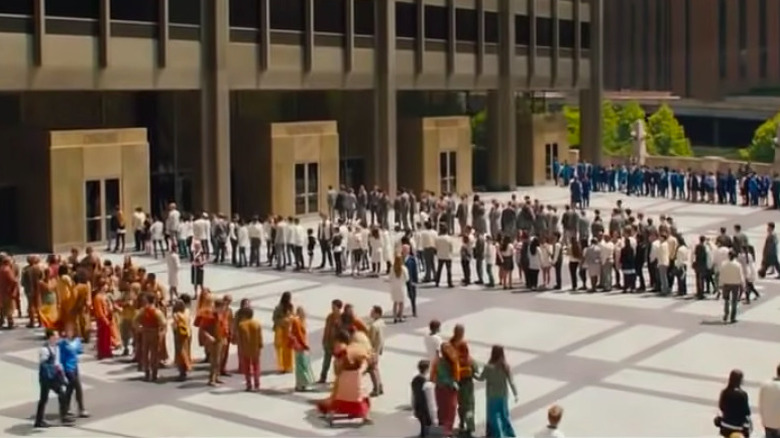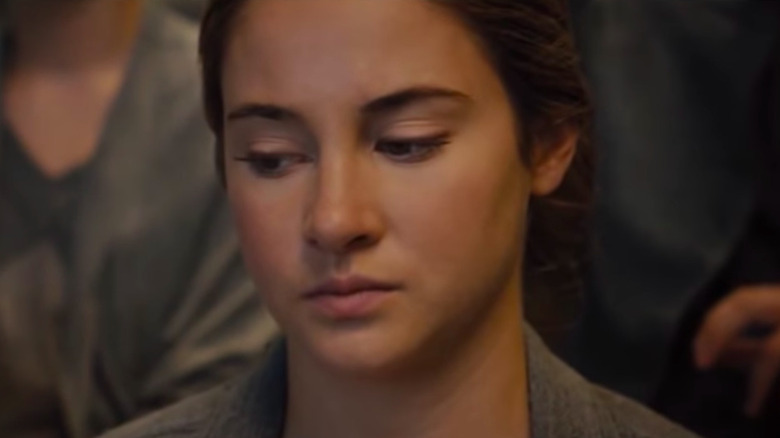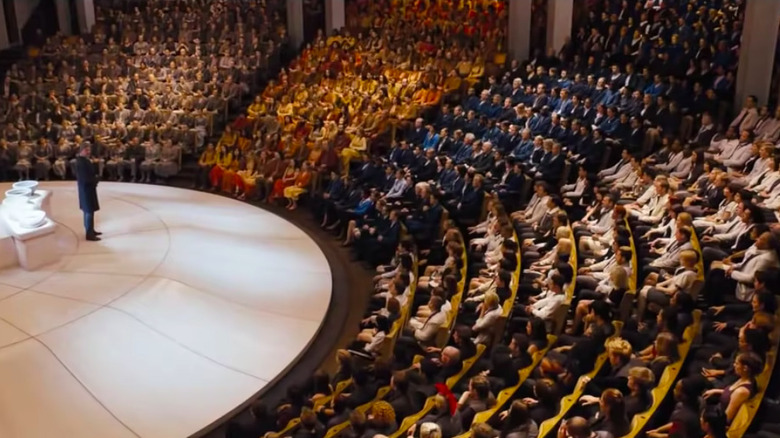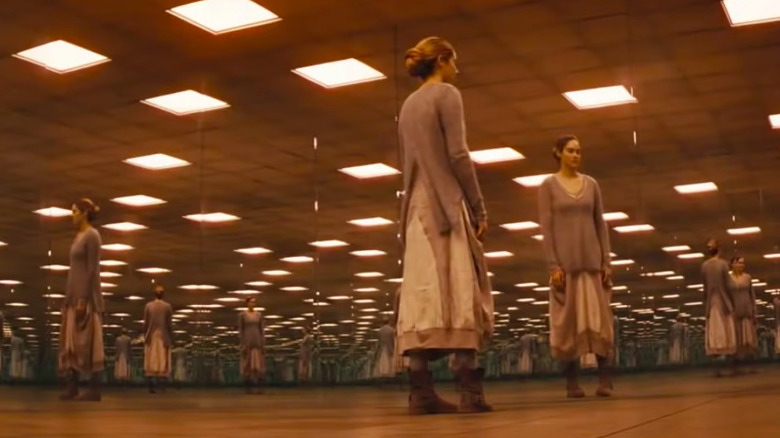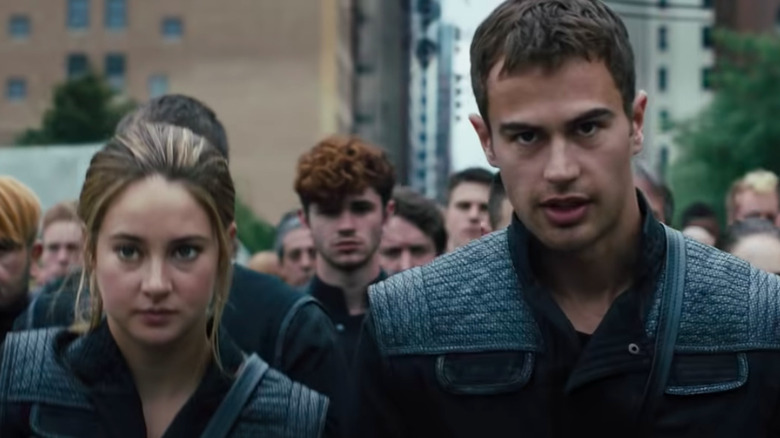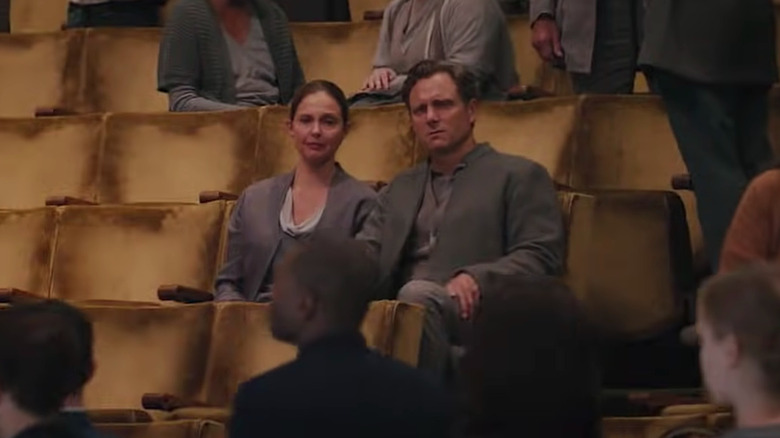Things Only Adults Notice During The Choosing Ceremony In Divergent
In "Divergent," the first movie in a trilogy based on the bestselling book series by Veronica Roth, the citizens in a post-apocalyptic Chicago have built their society on the idea that everyone should fit into one of five factions. Each faction emphasizes one particular personality trait or skill. Erudite members are smart, those in Amity are loving and peaceful, people in Candor are unwaveringly honest, Dauntless members are brave, and the people of Abnegation are selfless and charitable.
As teenagers, every citizen must choose their faction in a ceremony that all the city's most important people attend. Before they make their choice, however, everyone must take an aptitude test that tells them which faction they're best suited for. Unfortunately, for Beatrice Prior (Shailene Woodley), aka Tris, who was raised in Abnegation and was relying on the test to tell her who she should be, her results show she could fit into Abnegation or Dauntless or Erudite. This makes her Divergent, and as her proctor Tori (Maggie Q) explains, that means she's a threat to this carefully constructed society.
She's warned not to tell anyone and is left on her own to choose her faction at the next day's Choosing Ceremony. The ceremony is the centerpiece of the movie's first act and a key moment for Tris, however, it also includes many logical inconsistencies and other details that are likely to leave adults scratching their heads. Here are 12 things only adults notice during the Choosing Ceremony in "Divergent."'
The ceremony isn't sanitary
During the Choosing Ceremony, each participant is called up to a stage individually. Once there, they must use a knife to cut their hand and then drip a drop of blood into one of five bowls. Each bowl is filled with material that symbolizes one of the factions. There's water for Erudite, stones for Abnegation, glass for Candor, soil for Amity, and coal for Dauntless. While kids are likely to get caught up in the spectacle, adults will notice that nothing about the ceremony is sanitary.
The biggest issue is the knife the participants use to cut their hands. While the scene doesn't focus on it, nothing indicates an individual knife is provided for each participant. Instead, at one point, a man is shown grabbing the knife and wiping the blood from the previous participant off with a cloth before presumably putting it down for the next participant. However, unless that cloth had some powerful chemical on it, there's no way it cleaned the knife to the point that it's sanitary.
Then there's the matter of the bowls themselves. Adults will realize that with all that blood being dripped into them, they should be a gory mess. Yet by the end of the ceremony the bowls look as pristine as they did at the beginning. While that certainly makes the scene easier to watch, it doesn't make sense unless there's some sort of unexplained future technology at work.
The age of the kids participating in the ceremony isn't specified
Viewers who've read the novel "Divergent" will know that the citizens of Chicago go through the Choosing Ceremony at 16 years old. However, this tidbit isn't mentioned in the film, leaving viewers who haven't read the novel to wonder exactly how old the kids participating in the ceremony are supposed to be. Adults are likely to be particularly flummoxed as they'll notice the details don't quite add up.
Until the ceremony, everyone in this society lives with their parents, however most of the people participating in the ceremony look like they're in their early- to mid-20s. That seems late to leave home. On the other hand, those who know the ceremony participants are supposed to be 16 from the book will be confused by the fact that many of the supposed teens participating in the ceremony look older than they should.
Regardless of the way the cast looks, the movie was advertised as and relies on many tropes featured in dystopian coming-of-age films, which were especially popular in 2014 when "Divergent" was released, and adults will know that most of the protagonists of those films are usually in their mid-to-late teens.
By never being specific about the ceremony participants' ages, the movie lets the audience interpret things however they choose. Yet sidestepping the issue also creates unnecessary confusion.
It's never explained why Tris and Caleb go through the ceremony at the same time
Adding to the confusion surrounding the age of the people taking part in the Choosing Ceremony is the fact that Beatrice and her brother Caleb (Ansel Elgort) go through it at the same time. This is another plot point that's never explained in the film. Adults trying to figure this out may wonder if the pair are twins, but will also notice that it never comes across that way. Tris refers to Caleb as her brother not her twin, and the depiction of their relationship makes it seem as though Caleb is older than Tris.
Those who've read the novel will know that this latter interpretation of Tris and Caleb's relationship is correct. Caleb is older than Tris but by less than a year. As a result, he and Tris end up participating in the same Choosing Ceremony. Of course, a simple line of dialogue could have clarified the situation. By not addressing the issue, the movie likely left many adults puzzled.
There's got to be a less primitive way to choose than blood
Pop culture loves it when people bleed. And the Choosing Ceremony in "Divergent" is especially dramatic because of all the young participants willingly cutting their hands and bleeding into the bowls representing their factions of choice. The symbolism is clear. The ceremony essentially requires the teens to signify their allegiance to their chosen faction in blood. Given this is a life-long commitment, the grand gesture makes sense.
But it's likely to occur to many adults that it's strange that a society that seems to pride itself on how advanced it is would decide to use such a primitive method to express this choice. After all, those participating in the ceremony must go through a high-tech test that is intended to tap into their personality and categorize them into the faction where they fit best. Yet, the ceremony is not only about as analogue as it gets, it also involves self-harm. Some adults will find the clash between the ceremony and the depiction of the rest of Chicago society disconcerting.
Someone could end up in an unintended faction if they accidentally bleed in the wrong bowl
From the beginning of "Divergent," Tris has expressed her uncertainty about which faction she'd fit into best and what her faction choice could mean for her future. She was hoping her test would tell her which faction to choose, but the revelation she's Divergent failed to clarify anything for her. Tris still hasn't made a choice by the time she's on stage staring at the bowls in the Choosing Ceremony. As she ponders her decision further, Tris cuts her hand. And as a drop of blood slowly trickles to the side of her palm, it's clear she's still trying to make a final choice.
Yet, because of the way the scene is shot, adults may pick up on a potential issue with this selection method: Tris or another participant could accidentally bleed into an unintended bowl during the ceremony. After all, Tris' hand moves over several bowls as her blood creeps across her hand. What if her blood drops before she's reached the bowl she intended? After all, although all the participants in the ceremony in the movie look like they're experts at bleeding into their preferred bowls, realistically if someone cuts themselves too deeply or moves their hand to the wrong place there's the potential for a massive mistake to be made.
The teens are called up in reverse-alphabetical order
It's a small but interesting detail: the teens participating in the Choosing Ceremony are called up one by one in reverse-alphabetical order. That even extends to first names, as Beatrice's brother Caleb, with whom she shares a last name, is called up before she is. The movie never draws attention to it, but adults, especially those with last names in the second half of the alphabet, might notice its inclusion.
In our society, if individuals need to be organized, they're often instructed to order themselves alphabetically by last name. Adults who have spent their whole lives living with this system are likely to notice that in the movie's future-set Chicago, the decision has been made to do things in the reverse – at least in the Choosing Ceremony. It's not something that has any real significance to the plot, but adults may realize that it's yet another tiny detail that helps set the society depicted in the film apart from society as we know it today.
It's unclear how anyone learns anything meaningful about the other factions
Everybody in Chicago is aware of the five factions and their basic roles in the city. However, the movie suggests that no one participating in the Choosing Ceremony has direct experience with any of the factions outside of the faction they're born and grow up in. While this may not stand out to children, adults will realize that it seems odd that this society requires teens to choose a faction based on little to no knowledge of any but their own.
While the individuals going through the Choosing Ceremony are given the right to select any of the five factions, they can't really make an informed choice. After all, even if a teen believes they have the qualities exemplified by a specific faction, if they hate the day-to-day work of being in that faction, they'll come to deeply regret their decision. It seems like the teens who are on the verge of making this choice should at least spend a few days with each faction so regardless of what their aptitude test says or the faction they're most drawn to, they have first-hand experience with what becoming a part of each faction would mean for their lives.
This is Chicago citizens' one chance to exercise free will over their lives
"Divergent" emphasizes the fact that the teens at the Choosing Ceremony are given free will to decide on the faction they want to be a part of. While the ability to select the faction in which they'll spend the rest of their lives gives the illusion of self-determination and younger viewers will likely focus on the process of making this choice, adults will notice that it is the only chance Chicago's citizens are ever given to truly exercise free will. That's because the lives of everyone in this dystopian society are built around their faction's rules and restrictions. Everything they do, including who they interact with, the jobs they have, and the customs they adhere to, are dictated by their faction. Even those who are Factionless are constrained as they're never given the opportunity to have any meaningful role in society.
As a result, each citizen is limited as a child by the faction they're born into and then as an adult by the faction they choose. Requiring each citizen to choose their adult faction makes it more likely that citizens will feel like they've agreed to and accepted the constraints of their faction, but in reality, this is just another way to ensure the faction system stays intact.
It's cruel to force teenagers to make a life-long choice
Younger viewers of "Divergent" may find themselves considering which faction they'd choose and may even feel pretty confident in their choice, but adults will know those decisions probably won't stick. That's because unlike children, adults have had to make the choice to commit to careers and other adult roles. They also may have regretted those choices and decided to explore new options and opportunities. That perspective enables adults to realize that it's cruel to ask teenagers to choose a faction that they can never leave for the rest of their lives.
After all, while the aptitude test each Choosing Ceremony participant is required to take is meant to guide their faction selection, they can choose whatever faction they want. That means they could rebel against the test and choose the faction that's as different as possible from the one their test says they're best suited for. Or they could choose their parents' faction because it's familiar, even if their test says it isn't a good match. Or they might initially like the faction they choose but question their commitment to it when they mature a little more. In other words, adults will know that because teenagers are still growing and changing, forcing them to make a life-long commitment will set many of them up for unhappiness or failure.
It doesn't make sense that people can fit into another faction if they don't have the aptitude
The society of "Divergent" is built on the idea that everyone can fit into only one faction. The adults don't only test each person before the Choosing Ceremony to determine what faction they're best suited to. After the teens have made their choices, each faction tests their initiates to ensure their thinking exemplifies the thinking of someone in that faction — but participants can also choose a faction other than the one the test says they fit into. While children may overlook it, adults will be perplexed by this because it essentially means that someone can rewrite their aptitudes and inclinations simply by joining a different faction.
When they select a specific faction, people must strongly rely on certain traits while ignoring others. However, what if someone whose test says they should be Dauntless decides they want to join Erudite? By joining Erudite, they don't automatically become smarter while simultaneously becoming less brave and inclined to physical activity. Yet, if each individual in this society is supposed to only fit into one faction, this would have to be what happens. Otherwise, everyone who chooses a faction other than the one their test points to would be Divergent. And if that were the case, the faction system would presumably have broken down a long time ago.
The faction system is more likely to lead to strife than peace
As anyone who's played a team sport knows, it's easy to feel like your team is the best and the other teams are the enemy. This is the same for any group. If you're a part of a group, you're biased to favor it. If there's another group that challenges yours, you and the rest of your group are likely to think of it as bad, even evil.
This is a common experience for middle and high school students who often join and feel deeply loyal to a specific social clique. Still, they may not notice how much the faction system of "Divergent" parallels social cliques. Many adults, however, will notice that the divisions championed by the faction system are a problem and that the Choosing Ceremony perpetuates the issue.
While the story contends that the faction system is what maintains the peace in Chicago, adults will know that if one faction gets something another feels it should be entitled to, that peace will crumble. In fact, that's essentially what happens in the film, as Erudite takes out the Abnegation faction because they believe they should be the faction that controls the government. Moreover, because each individual is forced to choose their faction, they may be inclined to aggressively champion their faction over others because this will help them feel good about their selection. In other words, everything about this system sets the factions up for conflict.
The idea of loyalty to faction over family is unrealistic
One of the principles of society in "Divergent" is that once someone has selected their faction during the Choosing Ceremony, they must put that faction ahead of everything, including their family. While children may not realize it, adults who have left home but still feel the pull of loyalty toward their birth families will know this is unrealistic. Of course, faction and family won't be in conflict for anyone who chooses to stay in the faction in which they were born. However, those who choose a different faction are likely to have a hard time adhering to this tenet.
After all, children are raised with their families until the Choosing Ceremony. They don't gradually leave the nest, they make a decision at the ceremony and are immediately expected to join their faction. But pushing everyone into adult roles this way is sure to make them miss their families, something that's unlikely to increase their allegiance to their faction. While some people may be able to put faction over family, many will have a difficult time turning off their feelings of love and devotion to the people who raised them.
